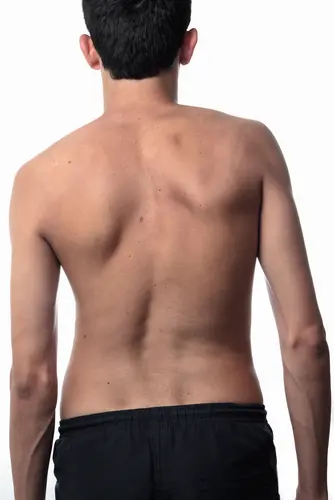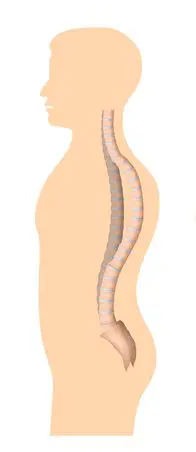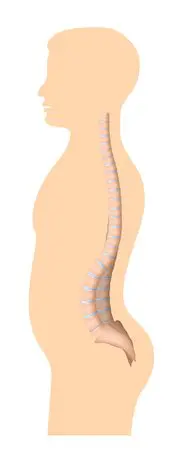A healthy spine has a gentle curve to it and is pain-free. If you have a spinal abnormality, the curvature of your spine may appear exaggerated in certain places. Learn the difference between scoliosis, kyphosis, and lordosis, plus the treatments you should pursue if you’re diagnosed with any of these abnormal spine curvatures.
 Scoliosis
Scoliosis
This condition is the most well-known abnormal spine curvature. Scoliosis is defined as a sideways C- or S-shaped curve of the spine, affecting the middle back, lower back, or both.
Causes
The most common type of scoliosis – known as idiopathic scoliosis – has no specific cause. Sometimes the condition is hereditary. Other times, an underlying disease, injury, infection or birth defect is to blame.
Symptoms
You or your child may have scoliosis if you notice these symptoms:
- Uneven shoulder blade height
- Uneven waist or hips
- Leaning to one side
- Spine that appears curved from the back
Treatments
Standard scoliosis treatments involve “watching and waiting,” and then putting you or your child in a painful, restrictive brace. These are not the treatment methods we use here at Spine Correction Center of the Rockies!
As one of only a few clinics in the US to operate as a Scoliosis Treatment Center, we can address curvatures as small as 5 degrees. We offer both standard scoliosis treatment and intensive scoliosis treatment for patients of nearly any age. No matter what path you choose, our treatment plans have the same goal: to stabilize and reduce your scoliosis naturally. The main difference is the length of time you spend in treatment.
 Kyphosis
Kyphosis
If your upper back is rounded with a curve greater than 50 degrees, you may have kyphosis.
Causes
You may develop a rounded upper back for several reasons, including:
- Poor posture
- Congenital birth defect, including abnormal vertebrae or spinal column development
- Scheuermann’s disease, which causes misshapen vertebrae
- Degenerative spinal diseases, such as arthritis or osteoporosis
- Infections or tumors in the spine
Symptoms
You can usually tell just by looking that someone has kyphosis. Symptoms include:
- Hunched back with the neck bent forward
- Inability to stand up straight
- Fatigue in the back or legs in the case of Scheuermann’s kyphosis
Treatments
Mild postural kyphosis, which is caused by poor posture, is usually not formally treated, except with suggestions to improve your posture. For more severe conditions, treatment is available at Spine Correction Center. Our kyphosis care includes strengthening exercises, physical therapy, spinal manipulation, and other rehabilitative procedures.
 Lordosis
Lordosis
Also called swayback, lordosis is characterized by an exaggerated inward curve of the lower spine.
Causes
If your child shows signs of lordosis, it could be a benign juvenile case that he’ll outgrow. This type of abnormal spine curvature is also associated with the following conditions:
- Achondroplasia, a disorder where the bones don’t grow normally
- Spondylolisthesis, or the forward displacement of a vertebra, a condition that sometimes occurs after a break or fracture
- Osteoporosis, which can cause compression fractures in the spine
- Obesity
- Kyphosis, since having an abnormally rounded upper back could cause the lower spine to curve inward
- Infection in the spine
Symptoms
You may have lordosis if you spot these symptoms:
- Swayback appearance, even when you attempt to stand up straight
- More pronounced buttocks
- Large gap between the floor and your lower back when you lie down
- Chronic back pain
- Difficulty moving in certain ways
Treatments
If you’re overweight, we suggest starting a weight loss program to help take pressure off your spine. Then, visiting Spine Correction Center gives you access to physical therapy treatments, active body orthotics, chiropractic adjustments, and other non-surgical, non-pharmaceutical techniques to improve your spinal health and reduce back pain.
Visit Spine Correction Center for a Free Consultation
If you’re tired of your abnormal spine curvature getting in the way of your daily activities and impacting your physical appearance, visit Spine Correction Center for a free consultation. We’ll help you decide which treatment path is right for you or your child so you can avoid invasive surgery. To schedule your initial visit, please contact Spine Correction Center in Fort Collins at (970) 658-5115.

 Scoliosis
Scoliosis Kyphosis
Kyphosis Lordosis
Lordosis